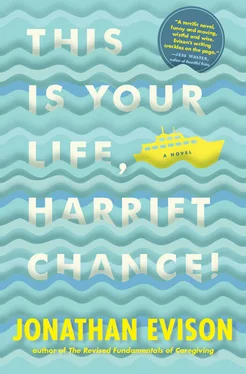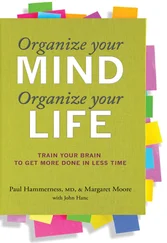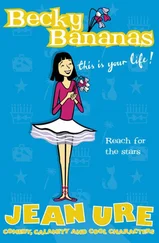Still, he saved our life, Charlie Fitzsimmons. Not that we owe him anything. I mean, it’s only one life.
But let’s not dwell on debts, Harriet. Instead, let’s talk about the moment, that instant when we leave our body, when we feel our mother’s legs, the grass, and the whole world begin to recede, as though down a dark vortex. Let’s talk about that millisecond of instinct, that invisible force that seizes us, body and soul, and pulls us back into the world, just as sure as Uncle Charlie drags us out from under the table by the ankles.
That invisible force, that was you, Harriet, that was us, before we parted ways, wanting to live.
August 25, 2015 (HARRIET AT SEVENTY-EIGHT)
It’s sixty degrees and drizzling when Harriet, Caroline, and Kurt disembark in the bustling port of Ketchikan, the cruise’s final scheduled stop. According to the pamphlets, this rain-battered hamlet of eight thousand is Alaska’s southeasternmost city and also its most densely populated. A working-class town smelling of barnacles and rust, wood rot, and diesel smoke, wet dog hair in heaters, and fish nets hung out to dry. Despite civic-minded efforts to splash some vibrant color about, there’s no disguising the town’s blimp gray underbelly.
Kurt guides Harriet’s wheelchair down along the piers, among the kiosks and buses and herds of grazing tourists. She’s found an unlikely new companion in Kurt Pickens. On the bus ride to the Saxman Native Village, he sits directly across the aisle from her, taking up two seats. Once again, he’s clean-shaven, and wearing a T-shirt (with sleeves, Harriet notes with satisfaction), announcing I’M A VIRGIN (BUT THIS IS AN OLD SHIRT).
“Y’all are sure you don’t mind me tagging along now?”
“Why, dear, we invited you, didn’t we?” says Harriet.
The bus is an ancient charter with blistered paint, squeaky seats, and a clattering diesel engine. The tour guide, whom Harriet can barely hear over the din of the engine, though spirited and delightfully informative, has an unfortunately lazy s : “To the thouth, you’ll thee Printh Rupert Thound.”
Pressing her face to the window, Harriet gazes out as the creaky old charter hugs the fog-tattered narrows along a two-lane highway. She learns all about Ketchikan and Revillagigedo Islands, learns of the 150 inches of rain per year, the world-renown fishing, the defunct brothels and pulp mills, along with its protected forests and misty fiords. She learns about the Tlingit people, a matrilineal culture of clans, the People of the Tides, as they call themselves.
At the Saxman Village, the bus empties into a mist of rain, its cargo spreading out toward the Clan House and the gift shop and the grand totem poles, arranged in lines and half circles throughout the village. Kurt and Caroline take turns pushing Harriet from one pole to the next, where Kurt reads the placards aloud.
“How ’bout that? Says here inanimate objects were forbid den on totems — only living things could be portrayed. Seems to me, I seen one out near Pikeville with a hamburger on it, but I reckon it wasn’t Tlingit.”
The carvings are at turns playful and menacing, mischievous and somber. Harriet is particularly compelled by the stories they tell. The clan histories: Eagle and Raven and on down the line to Bear and Frog and Fox, Wolf and Beaver. The narratives of a people and the histories they cannot outrun. The inheritance of identity, committed to form, displayed for all the world to acknowledge. All the humiliations, tragedies, quarrels, debts, and shames bequeathed them through the unyielding cycle of generations. And other tellings, anecdotal by comparison: a birth, a wedding, a funeral. And on the edge of the village, away from the rest of the totems, a lone pole, faded and weather-beaten, telling the story of a child’s mysterious disappearance. For the second time in two days, Harriet intimates her impending death.
“What’s wrong, Mom?” says Caroline when she sees that Harriet’s eyes are misting over.
“It’s nothing, dear.”
Kurt clears his throat. “Well, think I’ll mosey on over to the gift shop.”
Harriet and Caroline watch him lumber off down the gravel path, Harriet wiping her eyes. Halfway there, Kurt turns and points up at the sky.
“Y’all see that?” he shouts.
A pair of bald eagles, maybe two hundred yards off, bank high and wide in the southern sky. Harriet and Caroline watch them arc to the east, then circle north into the wind until they glide westward, not fifty yards above the Clan House.
“They make it look easy,” says Harriet.
In the gift shop, Caroline parks her directly in front of an end-cap display of miniature totem poles, then drifts toward the racks of postcards. Kurt is in the far corner, thumbing through Native art. When no one is looking, pride insists that Harriet abandon her wheelchair and hobble outside, around the corner to the portable bathroom, which she’s relieved to find well maintained.
Afterward, she pulls her pants up and straightens her hair in the blurry mirror. When she makes to leave, she finds the doorknob uncooperative. Inadvertently, she has managed to lock herself in the bathroom. Fiddling with the lock, she finds that the mechanism won’t budge. She knocks and knocks on the door, but nobody seems to hear her. She twists the knob, finesses it, jiggles it every which way, without success.
“Hello?” she says. “Is anybody out there?”
Outside, in the distance, she hears the throaty rattle of the bus’s diesel engine as it fires up. She pounds the door a little harder, with a hollow thunk-thunk-thunk.
“Hello, hello,” she says. “In here! Can somebody help me?”
Relax, she tells herself. Somebody’s bound to need the bathroom before long. They couldn’t possibly leave without her. Caroline wouldn’t allow it. They’re probably looking for her right this minute. Still, she continues twisting the knob this way and that, kicking the door with her tiny orthopedic shoe, until after five minutes she’s arrived at a considerable state of anxiety. God, don’t let it be here. Not in a public restroom!
“Help! Somebody! In here!”
Suddenly she feels a pinch at the back of her skull, and just like that, she’s got a headache.
“Somebody, please,” she says. “In here!”
Her limbs go heavy in an instant as her vision begins to blur. Dizzy, she lowers herself back down on the toilet, her heart beating rapidly.
“Somebody help me,” she says breathlessly as her anxiety edges toward panic. Stay calm, she tells herself, it’s only a spell. She quiets her breathing enough to call out again. “In here!”
Just as her heart starts picking up speed again, the doorknob begins to jiggle from the outside, then two brisk knocks.
“Y’all in there, Harriet? The bus is fixin’ to leave.”
Oh, thank God for Kurt Pickens, her knight in shining armor!
“Dear, I’m locked in. The doorknob is broken.”
“Well now, just hold tight. I’ll be right back.”
She hears his heavy footsteps down the gravel path.
Within minutes, Kurt returns with the proprietor, who, at some length, begins liberating Harriet with the aid of an electric drill and what sounds like a sizable mallet. With her impending release, Harriet’s anxiety abates. Her dizziness subsides. Her heart slows, and her breathing returns to normal, though her slight headache persists, little more than a pinprick of pressure at the base of her skull. Nothing half a Vicodin can’t fix.
Outside, the weather is breaking.
“Thank God, you heard me,” says Harriet, clutching his huge hand.
“Y’all don’t honestly think we’d forget you?”
As Harriet resumes her seat on the bus, the sun is fighting its way through the clouds. Whatever happened back there in the bathroom has passed. Harriet feels her strength returning with each breath. Her thoughts regain their sharpness. All things considered, she’s cautiously optimistic that she’s not dying.
Читать дальше












